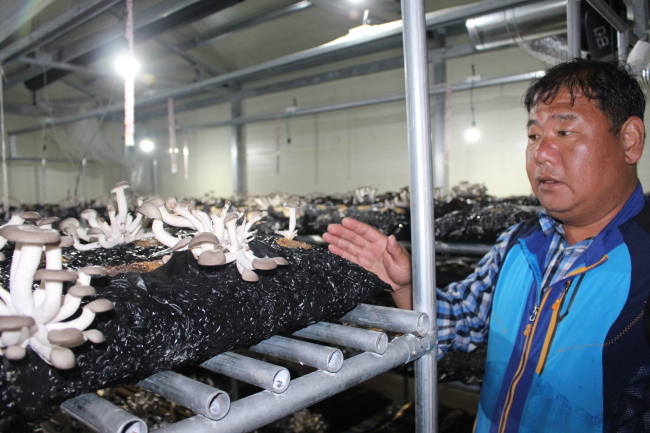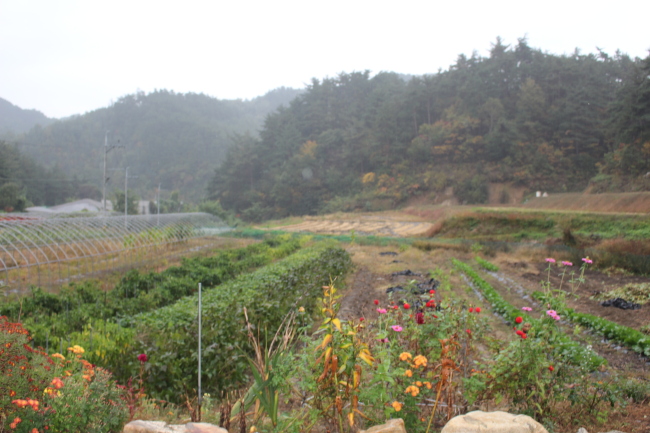[Weekender] Seeking sanctuary from stressful city life
By Yoon Min-sikPublished : Oct. 21, 2016 - 18:00
For 48-year-old Yeom Deok-gi, settling in the countryside had always been the dream.
Now a mushroom farmer, the former soldier said the pressure of South Korea’s competitive and hectic society had motivated him to take on the rural life.
Now a mushroom farmer, the former soldier said the pressure of South Korea’s competitive and hectic society had motivated him to take on the rural life.

“It’s stress, really. You know how you try to hold it in, but sometimes feel like you’ve had enough and are about to explode? I felt I would explode someday, which is why I came here,” he said.
Having joined the Army in 1987 right out of high school, Yeom said he was under a lot of stress as a sergeant major, caught between conscripted soldiers and ranking officers.
In 2014, he ended 27 years of service in the military and retired to a tiny rural town in Myeongji-ri, Gangwon Province, where he would lead a quiet, stress-free life, far removed from the social hierarchy and peer competition of his previous life.
Yeom joined an increasing number of city dwellers trading urban life for the countryside. The fad is called “gwinong” here, which roughly translates to “return to agriculture.”
According to the state-run information center on gwinong (returnfarm.com), there are currently 11,959 households in the countryside made up of families who moved from cities. About 18.6 percent dwell in North Gyeongsang Province, followed by South Jeolla and South Gyeongsang provinces at 15.6 percent and 13.5 percent, respectively.
But rural life is no picnic, the third-year farmer pointed out.
“If you decide (to farm) in a certain area, you need all the information you can get. In the past, people didn’t need a lot of money to start farming. But this is not the case, now,” he said.
He moved to the rural home with 200 million won ($176,000). Most of the money went to buying his humble plot of 3,322 square meters and building a house. His military pension helped him get through the next couple of years, when he lacked immediate income.
“Farming in the fields hardly pays enough to make a living when you are an amateur,” he said, revealing his total net income from vegetable farming last year was about 2 million won.

This year, he is trying new things, including growing oyster mushrooms indoors. He found that for an amateur farmer like him, the controlled environment of the greenhouse is much better, enabling him to make more money with less effort.
“For the first year here, my goal was to make 10 million won in farming. It looks like this year I will be able to exceed that goal by 2 million,” Yeom said.
He plans to build another greenhouse for the mushrooms on spare land, which is expected to triple the profit.
Still, it will hardly be a bonanza, but Yeom says money is not the main issue when the quality of life is satisfying.
“I can work when I want, sleep when I want. We have a beach and a valley just a few minutes away,” he said. Also sitting just a stone’s throw away from his home is Seoraksan, the province’s most popular tourist attraction.
The neighborhood of Myeongji-ri is another reason he feels life is more fulfilling here.
In cities, people rarely interact with neighbors, but that is not the case in rural communities, he said.
“We help each other out when there’s some work to be done. When you first move, it definitely helps to participate whenever there’s a town event, because it helps them get a good impression of you,” he said.
Rural life, however, is not for everyone, he pointed out. Sometimes the inconvenience and hardship can be too much, which is why he recommends potential movers to get some real experience before actually making the move.
On Wednesday, he had two guests from cities who are looking to move to the countryside. They came to see what it was like to live there.
One of them said he used to run a Japanese restaurant and made up to 200 million won a month. Another was a 33-year-old man who was quickly growing weary of city life.
“A part of me thought that 33 was too early. But then again, maybe starting early is a good thing because it would help him get settled early,” Yeom said.
With growing interest in rural life among Koreans, there has also been an increasing number of swindlers targeting them.
Last week, police busted a crime ring that swindled 12.4 billion won from 1,300 people by luring them with high profits.
“Farming is not something you make a ton of money with. Don’t expect a jackpot when you come here. And when you decide on what you want to do, stick to it.
“And finally, get all the information and experience you can. Even if you don’t end up cultivating that specific crop, you can at least learn a thing or two,” said Yeom.
By Yoon Min-sik / (minsikyoon@heraldcorp.com)



![[Exclusive] Korean military set to ban iPhones over 'security' concerns](http://res.heraldm.com/phpwas/restmb_idxmake.php?idx=644&simg=/content/image/2024/04/23/20240423050599_0.jpg&u=20240423183955)

![[Graphic News] 77% of young Koreans still financially dependent](http://res.heraldm.com/phpwas/restmb_idxmake.php?idx=644&simg=/content/image/2024/04/22/20240422050762_0.gif&u=)



![[Pressure points] Leggings in public: Fashion statement or social faux pas?](http://res.heraldm.com/phpwas/restmb_idxmake.php?idx=644&simg=/content/image/2024/04/23/20240423050669_0.jpg&u=)










